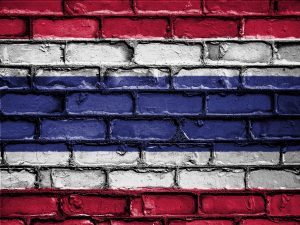A man who posted a photo online showing himself wearing a shirt with a motto questioning the traditional reverence for Thailand’s monarchy has been admitted against his will to a psychiatric hospital, drawing concern from human rights activists.
The legal basis for putting 45-year-old Tiwakorn Vithiton into the Khon Kaen Rajanagarindra Psychiatric Hospital in the northeastern province of Khon Kaen is not clear.
Tiwakorn caused a stir by posting pictures on his Facebook page of him wearing a T-shirt with the motto “I have lost all faith in the institution of monarchy.” Publicly criticizing the monarchy in Thailand is both socially taboo and legally risky.
Cases where people are suspected of defaming the monarchy have traditionally been prosecuted under a lese majeste law that carries a punishment of 3 to 15 years in prison.
The law has long been abused for political purposes to silence dissidents, but in recent years the number of cases has declined as the government instead has employed laws covering computer crimes and sedition. In June this year, King Maha Vajiarlongkorn told the government it should not prosecute lese majeste cases.
Khon Kaen police chief Maj. Gen. Puttipong Musikul told The Associated Press on Wednesday that Tiwakorn has not been charged with any crime and was hospitalized for medical reasons. Hospital director Dr. Nathakorn Jampathong said Tiwakorn has been undergoing psychiatric evaluation since being admitted on July 9.
“All I can tell you is that he is fine. And the evaluation is still going on,” Nathakorn said in a phone call.
Yingcheep Atchanont was one of a small group of human rights defenders who visited Tiwakorn on Monday at the hospital.
“He seemed to be okay but wasn’t sure in what legal capacity he is being held,” said Yingcheep, who works with iLaw, an independent justice watchdog group.
He said Tiwakorn’s family told him hospital staff and police had to force him when he resisted going to the hospital, following an earlier visit to their home by doctors who questioned him.
Yingcheep said there has been a surge of public interest this year in expressing opinions on Thai politics and society, and people had found workarounds to speak out without violating repressive laws.
He described Tiwikorn, who is not a public figure and not known to be the member of any organized group, as “clever” in how he expressed his opinion.
The authorities have responded to the outpouring of free speech with measures outside the law, such as putting pressure on their targets of concern by visiting their families’ homes and talking to their teachers.
He said there are 13 lese majeste cases out of 89 that iLaw has monitored where the accused have ended up confined in mental hospitals.
“Tiwakorn’s case is the first in which the authorities had someone committed someone straight to the psychiatric facility without having gone through filing charges and legal detention first,” said Yingcheep.
Treating dissidents as mentally ill is not a novel practice in authoritarian states. The former Soviet Union was especially notorious for having critics declared mentally ill so they could be put away without going through legal processes that could help validate their claims to be political prisoners.
By Busaba Sivasomboon for the Associated Press
Associated Press videojournalist Tassanee Vejpongsa contributed to this report.

































